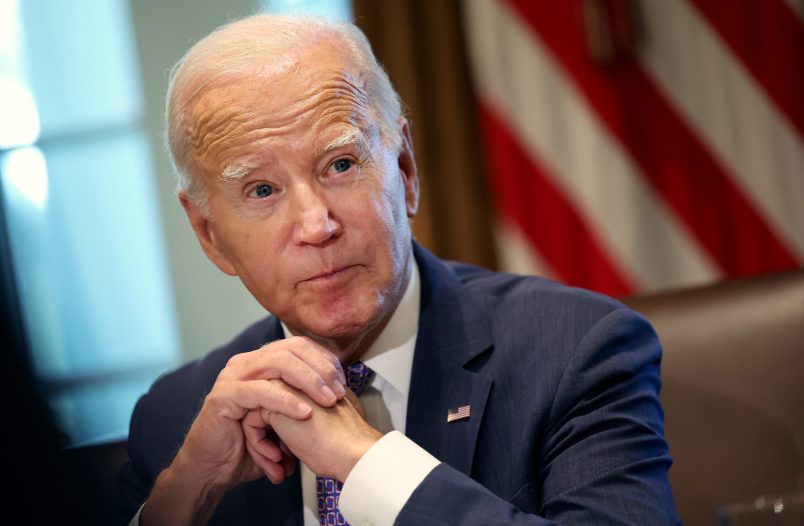In politics and in our personal lives we are often spinning ourselves in circles searching for explanations of the inexplicable when a bit of comparative analysis would do us wonders. For Democrats an abiding question of the Biden presidency, especially in 2024, is this: why hasn’t Joe Biden gotten more credit for the roaring 20s economy? Growth is steady, unemployment is at historic lows, inflation has fallen dramatically, wages are rising. Each rosy data point purports to have a context which shows it isn’t all its cracked up to be. And some of those contexts bear consideration. But the G-7 summit in Italy this last week is perhaps the most clarifying context.
A number of articles touted the summit as the story of the comparatively popular and recently elected Giorgia Meloni, Prime Minister of Italy, greeting a series of “dead men walking.” One write-up lined up each leader’s net approval rating as a kind of thought bubble over their head. The comparison is illuminating. Biden was there with the albatross of a -18.5 net approval rating, which has profoundly weighed down his reelection prospects. But look at the others. The leaders of Germany and the UK both have net disapproval numbers deep in the red. Emmanuel Macron is at -31. Justin Trudeau, who everyone once loved, is at -38. The Prime Minister of Japan is at net -40.
Of the major economic powers — in which group Italy really doesn’t belong — Biden is far and away the most popular. Meloni is characterized as the one leader truly sitting pretty, mostly because her far right party just cleaned up in the EU elections, along with other parties of the far right. She was also just elected 20 months ago. She’s still the new face who the bums were thrown out to make room for. But even she’s 10 points underwater.
The quick thought is that maybe this is just a west-side phenomenon, or something affecting all the major industrial democracies. Post-COVID crisis everyone’s unpopular, despite buoyant economies. But that theory doesn’t quite hold up either. The U.S. is actually a major outlier on this front. The U.S. economic recovery has been substantially more robust than in most of these other countries, which have seen economies stagnate in nominal recovery, often with continuing high inflation. What is also notable is that the present U.S. economy is that rare case where a country’s economic performance can be quite credibly credited to specific policy decisions of its head of state. Biden went all in on relief and recovery spending and it appears to have paid off, in contrast to the austerity-tinged policies in Europe.
What does it all mean?
Biden has to run for reelection in this country. He can’t point to the fact that Olaf Scholz and Rishi Sunak are mired at net negative 50 point disapproval and expect that to help him beat Donald Trump. But this comparative perspective can help us as observers understand what is happening and also just what needs explaining. When we see that Biden, perversely, isn’t getting credit for a robust economy, it is treated as an inexplicable disconnect that requires an alternative explanation. So maybe the traditional economic data we use to judge economic performance no longer applies. Or maybe the economy is great but people don’t see it because Biden’s super old. Or perhaps rising wages and minuscule unemployment don’t matter to people because high interest rates are making it hard for them to buy a house.
But this is probably all missing the bigger picture. If you set out to explain the mystery of who came into the house and took the food you’re likely to come up with some pretty outlandish explanations if the food was actually in the house, just in a different drawer than you remembered putting it, all along. The evidence from all these other countries suggests that any explanation that focuses mainly on Joe Biden or the things internal to the United States is likely to miss most if not all of the story.
When you step back from all this there is a far more economical explanation. Electorates in the industrial democracies of Europe, North America and East Asia remain in a state of profound pessimism coming out of the COVID epidemic. And it is only the robust U.S. economy that is keeping Biden’s net disapproval hovering between 15 and 20 points rather than 40 or 50 points. And that robust economy is largely do to his very Keynesian fiscal policies pushed through during his first two years of office.
Again, this insight doesn’t make Biden suddenly popular. But it helps clarify what is and isn’t happening. Political commentary today is often stuck in fluffy and insubstantial theories which really don’t add up. And that is because most are asking the wrong questions. It’s not that Biden isn’t getting credit for the hot economy or that voters refuse to see that it’s good. He is getting credit. It’s what’s keeping him as popular as he is despite the broader post-COVID wave of public pessimism affecting all incumbents.






